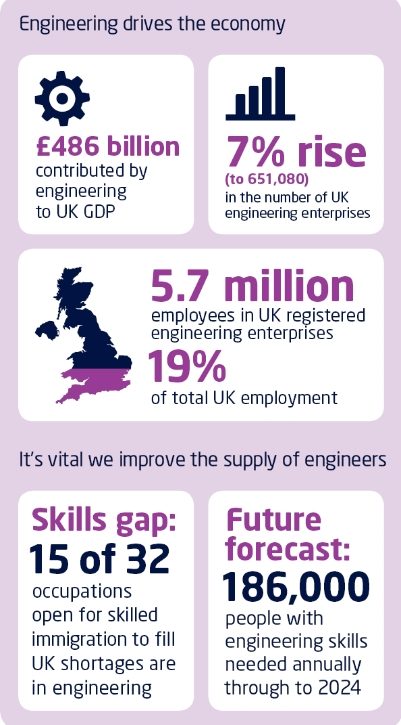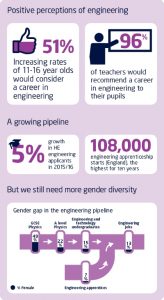Thousands more opt for university apprenticeship courses but it is important that quality is not sacrificed in a rush to expand them further, Aban Contractor writes.
The number of people opting for degree apprenticeships (DAs) in England has risen 658 per cent – from 640 in 2015-16 to 4,850 in 2017-18, according to a report to be published today.
Degree apprenticeships: realising opportunities, compiled by Universities UK (UUK), is based on a survey of 66 universities. Just over 90 per cent of respondents said they were actively involved in DAs with a range of employers, including Mercedes-Benz, Nestlé, IBM, Airbus and Transport for London.
First introduced in 2015, DAs allow apprentices to split their time between university study and the workplace and, as with other apprenticeships, course fees are shared between government and employers – not paid by the student.

Credit: EngineeringUK
However, Chief-Exec.com was told late last year that government plans to provide up to 1,000 nursing degree apprenticeships a year will cost NHS trusts in England about £200 million annually.
A Department of Health spokesman said then that each trust would help fund the Nursing DAs programme through the Government’s new apprenticeship levy scheme – applied equally to public and private sector organisations – that comes into effect in April. The trusts would then be expected to contribute 0.5 per cent of pay bill.
UUK said yesterday that DAs addressed key skills shortages, with chartered management, digital and technology solutions, and engineering representing the top three subject areas.
Chief executive of EngineeringUK, Paul Jackson, told Chief-Exec.com that engineering is a growth industry that has the potential to continue to drive the UK economy.
“But the industry is at a tipping point. The greatest need for apprenticeships in engineering is at level 3 and above, and with projections pointing to an annual shortfall of at least 20,000 engineers it’s encouraging to see that engineering features in the top three most popular degree apprenticeships,” he said last night.
“England has seen the highest number of engineering apprenticeship starts for 10 years and degree apprenticeships should help boost this number even further. The apprenticeship levy could create a perfect storm for diversifying the talent pool and driving up the number and profile of apprenticeships in engineering.”
England has seen the highest number of engineering apprenticeship starts for 10 years and degree apprenticeships should help boost this number even further.
University and College Union (UCU) general secretary, Sally Hunt said it was encouraging to see from the report that so many universities were already working with employers to deliver degree apprenticeships, but it was important that quality was not sacrificed in a rush to expand them further.
“UCU and others have raised concerns about some employer-led apprenticeship standards being narrowly drawn, so it’s vital that educators have a voice in developing new standards and qualifications,” she said yesterday.

Credit: EngineeringUK
“Universities must also support staff to ensure that workloads are not increased further as a result of growing the number of these qualifications.”
Universities UK said DAs provided opportunities for people who might not have considered university – including part-time and older students whose numbers had dropped drastically in recent years.
Universities were also asked to list the benefits and challenges of delivering degree apprenticeships. The fact student fees were paid and employers’ skills needs more closely met were listed as benefits. However, there were concerns about the continuing lack of awareness among some employers and the public about DAs.
President of UUK and vice-chancellor of the University of Kent, Dame Julia Goodfellow, said universities constantly strove to be flexible in the types of qualifications they offered to meet the needs of students and employers.
“Many people feel they have been left behind in the drive to increase higher level skills in recent years. Degree apprenticeships are an excellent way to get to these harder-to-reach groups while, at the same time, ensuring that what we deliver on campus meets the needs of students, the local area and its employers,” she said.
“The report shows that there is still a long way to go in communicating to students and employers how degree apprenticeships work and the mutual benefits. We would urge the government to work with us to do more here as part of its industrial strategy.
“The artificial dividing line between academic and vocational education is gradually disappearing. Degree apprenticeships build on the work that universities already do to deliver skills that employers need.”





